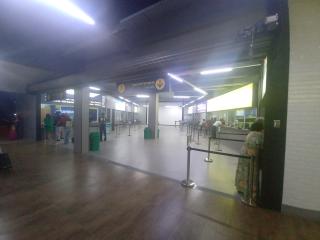Sign up for the most popular Skift daily download of news, happening, and headlines in the travel world
Veja Também -
 Minas Gerais entrega Medalha da Inconfidência a 171 personalidades e instituições
Minas Gerais entrega Medalha da Inconfidência a 171 personalidades e instituições Projeto 'Antes do Voto 2024' chega a Governador Valadares, Montes Claros e Uberlândia
Projeto 'Antes do Voto 2024' chega a Governador Valadares, Montes Claros e Uberlândia Projeto apoia população negra, minorias e influencers em Montes Claros
Projeto apoia população negra, minorias e influencers em Montes Claros Nova rodoviária de Governador Valadares impede acesso de populares; só com passagens
Nova rodoviária de Governador Valadares impede acesso de populares; só com passagens Projeto 'MP em Movimento, chega a Montes Claros, em 18 de abril
Projeto 'MP em Movimento, chega a Montes Claros, em 18 de abril- Veja + Revelia News
Revelia News
Postado dia 05/08/2022 às 15:37:29
Behind Brazil’s Plan to Launch South America’s First Digital Nomad Village

As a perfect example of how countries can embrace a "locals first" approach to tourism, the government is supporting a new NomadX-backed project in the north-west of the country, after a similar scheme in Europe injected $30 million into the local economy.
The company behind Europe’s first “digital nomad village” in Madeira, an autonomous region of Portugal, is now taking the project to Brazil.
A pilot project first being revealed to Skift will open in Pipa, in the country’s northeastern state of Rio Grande do Norte, on November 1 and run at least until the end of April.
Like most destinations during the pandemic, Madeira faced a slump in tourism. As a result, the regional government backed digital community NomadX’s village concept in the small town of Ponta do Sol.
That project launched in February 2021, and promoted accommodations, workspaces and networking events to digital nomads and remote workers seeking a change of scenery after a year of lockdowns. It was hailed as one of the first public-private sector initiatives of its kind, designed to stimulate economic activity.
Now a similar project has been given the green light by Brazil’s government, and will be the first of its kind in South America, according to Goncalo Hall, founder of NomadX, who said he managed to successfully demonstrate the economic impact such initiatives can have.
Regeneration Goals
NomadX’s Madeira project officially generated $30 million a year for local economy, based on the 6,000 people who registered for the program, Hall said, but he estimates the real amount could be as much double that.
The company behind Europe’s first “digital nomad village” in Madeira, an autonomous region of Portugal, is now taking the project to Brazil.
A pilot project first being revealed to Skift will open in Pipa, in the country’s northeastern state of Rio Grande do Norte, on November 1 and run at least until the end of April.
Like most destinations during the pandemic, Madeira faced a slump in tourism. As a result, the regional government backed digital community NomadX’s village concept in the small town of Ponta do Sol.
Free Daily Newsletter
That project launched in February 2021, and promoted accommodations, workspaces and networking events to digital nomads and remote workers seeking a change of scenery after a year of lockdowns. It was hailed as one of the first public-private sector initiatives of its kind, designed to stimulate economic activity.
Now a similar project has been given the green light by Brazil’s government, and will be the first of its kind in South America, according to Goncalo Hall, founder of NomadX, who said he managed to successfully demonstrate the economic impact such initiatives can have.
Regeneration Goals
NomadX’s Madeira project officially generated $30 million a year for local economy, based on the 6,000 people who registered for the program, Hall said, but he estimates the real amount could be as much double that.
This type of financial injection appealed to Brazil, and Hall predicts this next “village” will generate $36 million a year for Pipa’s community. Roughly 25 percent of digital nomads are entrepreneurs, so there’s more scope for longer-term spending, rather than just tourists and backpackers hitting the bars and beaches.
NomadX helps prepares locals to deal with an influx of remote workers and digital nomads, ensuring the infrastructure like accommodation and Wifi is suitable. The beach town of Pipa was also selected as it’s 90 minutes from Natal International airport, and has a good bus network. The initial focus will be on setting up co-living accommodation, and if successful, NomadX will continue with the program in partnership with the local municipality and state tourism board.
“The pandemic opened up the government to new solutions,” Hall said. “If tourism had been at full power, I don’t think the government would have had the bandwidth to even think about digital nomads.”
In fact, the village idea wasn’t originally designed for pandemic-weary digital nomads. Hall, who will be speaking at the inaugural Skift Global Forum East in December, said he first wrote a proposal for the Italian government five years ago, as a way to help it repopulate its smaller villages.
“Nomads appear at the top of the funnel, but the end goal is to create an ecosystem,” Hall said. “Yes, the shiny object is digital nomads, that’s how to attract people …. (but) there’s always a long-term vision to what we build.”
Building Them Isn’t Easy
It took two years to kickstart the Brazil project, Hall said. As well as dealing with coronavirus, the country is gearing up for general elections, scheduled to be held in October.
The government is a logistics and marketing partner, but not currently directly investing. That could change, however. “It’s the local tourist board, rather than national government for now, until we know who wins in October,” he added.
As well as at a state level, NomadX’s work can face other logistical challenges. Its project in Cape Verde, a series of islands off the west coast of Africa, struggled with airlift until a partnership was formed with TAP Air Portugal to bring down airfares. It also paired nomads with non-governmental organization to boost awareness.
However, its main mission is to work with hospitality and tourism companies already on the ground, including local guesthouses, hotels and Airbnbs. It collates the accommodation, employs community managers and connects its own digital nomad community with those local businesses.
The concept reflects Skift’s 2022 Megatrend: Communities Are No Longer Spectators in Travel.
“Tourism boards embracing a ‘locals first’ approach post-pandemic is here to stay, as is the imperative of having residents’ input on tourism management to ensure the industry’s future success,” Skift reported in 2021.
“The idea is when the government contract ends, you have all the space there. The government won’t give you money forever,” Hall said.
Central and South America are set to become hotspots for remote workers.
Speaking at Skift’s Future of Lodging Forum earlier this year, Sam Khazary, senior vice president of global corporate development at Panama-headquartered Selina, said the company was in the process of mapping out popular travel routes across the region.
French hotel group Accor, meanwhile, is seeing success in Brazil with its co-work space brand Wojo. Accor has 150 hotels that offer Wojo spaces located in South America, with about 100 in Brazil. There are also 40 participating properties in Peru, Argentina, Colombia and Chile.
Across the 150 hotels, one third offer private offices, and Accor said it was seeing an average of 10 to 20 clients each day in its co-working spaces, while several businesses have signed contracts to use private offices.
A spokesperson told Skift 50 more hotels in the region would begin offering Wojo by the end of 2022




